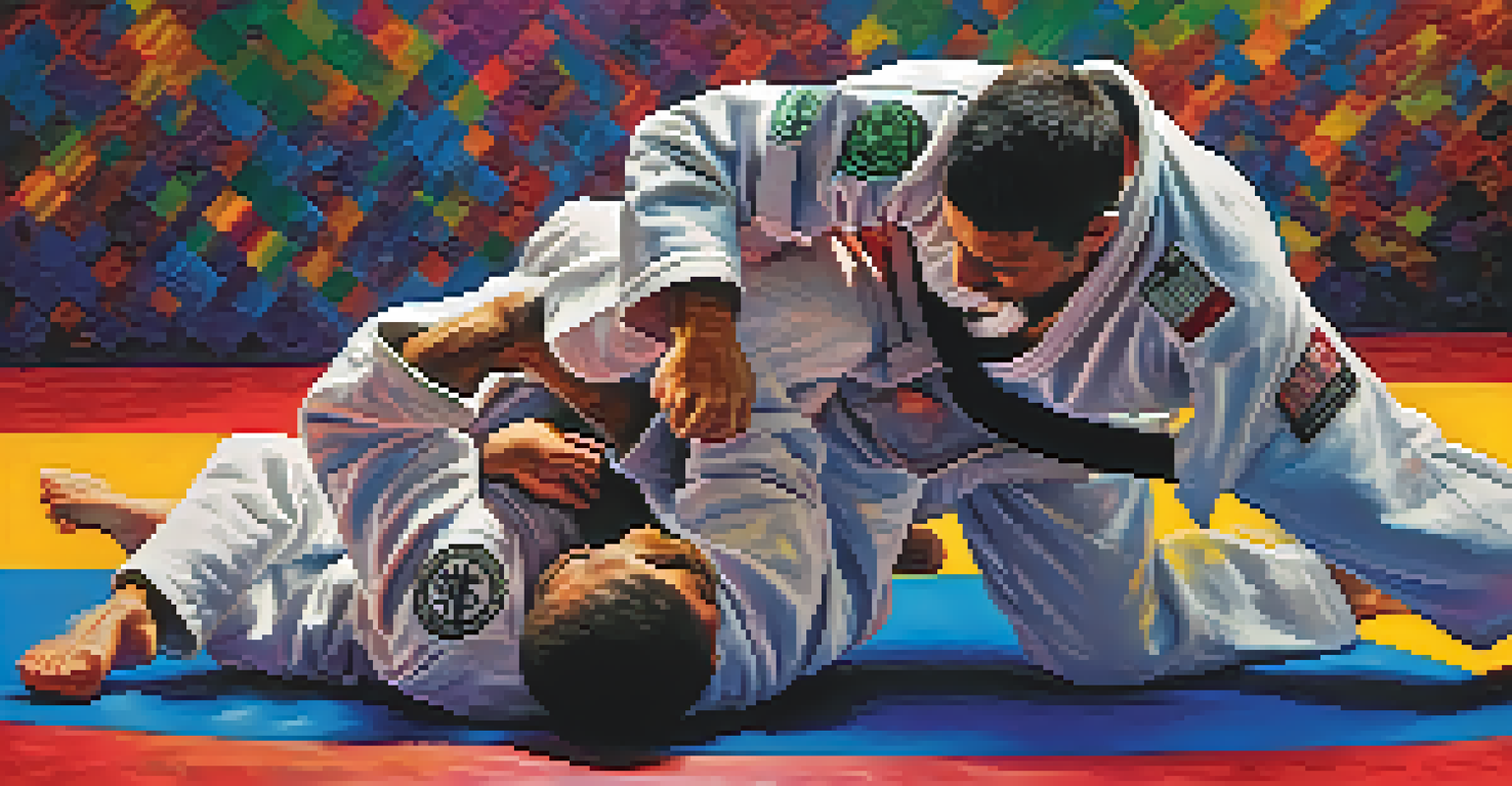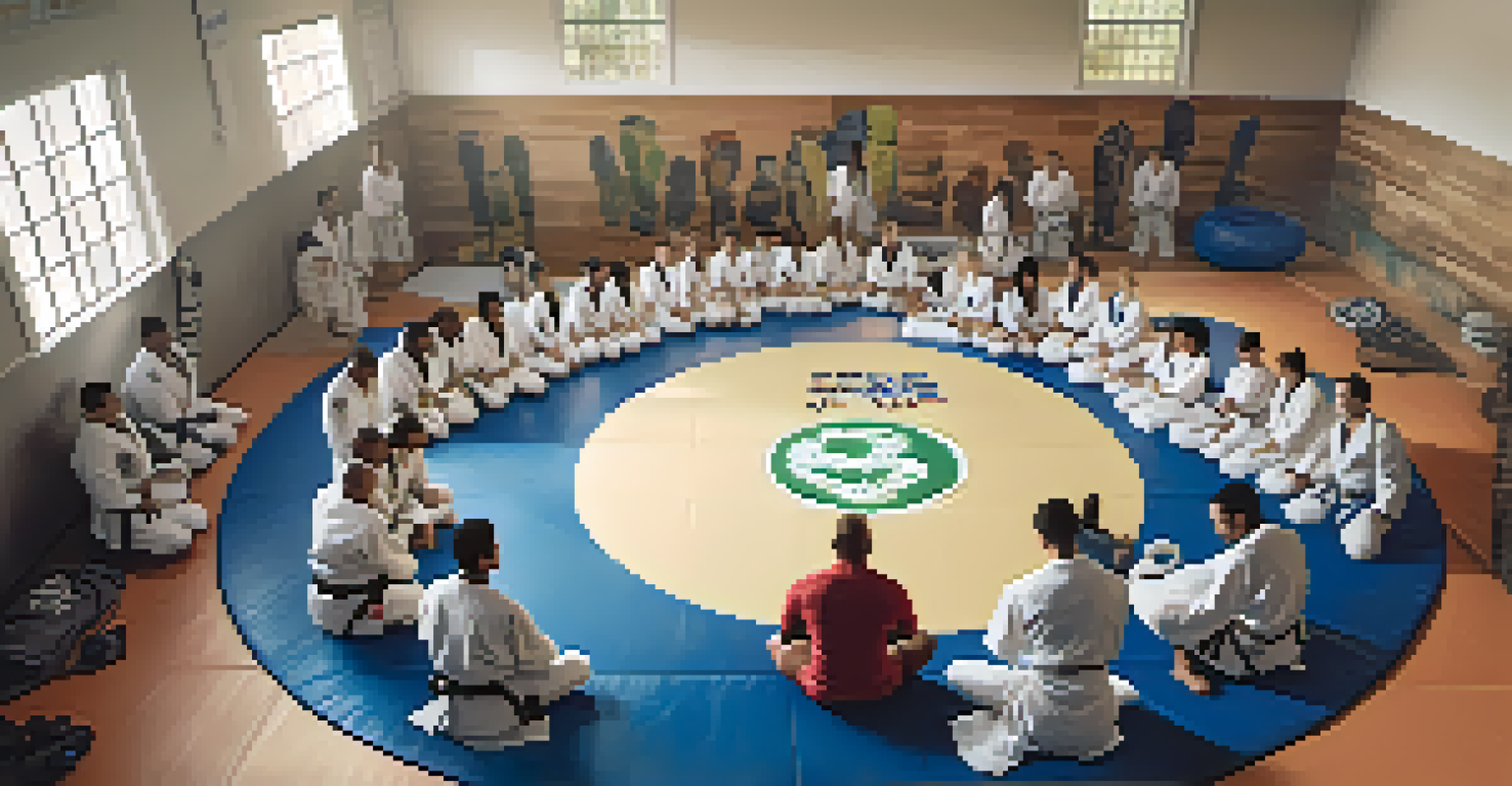Brazilian Jiu-Jitsu: Ground Game Techniques and Philosophy

Understanding the Essence of Brazilian Jiu-Jitsu
Brazilian Jiu-Jitsu (BJJ) is a martial art that focuses on ground fighting and submission grappling. Its roots trace back to traditional Japanese jiu-jitsu, but it has evolved significantly, emphasizing leverage and technique over brute strength. This makes BJJ accessible to practitioners of all sizes and skill levels, allowing a smaller person to defend against a larger opponent.
The greatest victory is that which requires no battle.
The essence of BJJ lies in its philosophy that technique triumphs over strength. This approach encourages practitioners to think critically and strategically, using skillful maneuvers to control their opponent. As you progress, you'll discover that mastering the art of timing and positioning is just as vital as physical prowess.
In many ways, BJJ mirrors life itself; it teaches you to adapt, be patient, and find solutions in challenging situations. The mental aspect of grappling often transforms practitioners, fostering resilience and confidence that extends beyond the mat.
The Importance of the Ground Game in BJJ
The ground game is a core component of Brazilian Jiu-Jitsu, where most techniques and strategies come into play. Once on the ground, the focus shifts to positional control, submissions, and escapes. Understanding how to navigate this terrain is crucial, as it can often determine the outcome of a match or self-defense scenario.

In BJJ, ground fighting is not just about overpowering opponents; it’s about using technique and leverage to gain a superior position. For example, if you find yourself on your back, employing the guard position allows you to defend against attacks while setting up your own submissions. This strategic thinking is what sets BJJ apart from other martial arts.
BJJ Prioritizes Technique Over Strength
Brazilian Jiu-Jitsu emphasizes leverage and skill, allowing practitioners of all sizes to effectively defend against larger opponents.
Additionally, the ground game emphasizes the importance of balance and weight distribution. Practitioners learn to use their opponent's weight against them, which is why many techniques can be executed effectively by someone who is smaller or lighter.
Key Techniques for Ground Fighting
Several fundamental techniques serve as the building blocks of the ground game in BJJ. Among them, the mount, guard, and side control are essential positions that every practitioner should master. Each position offers unique advantages and methods for transitioning into submissions or escaping.
In the middle of difficulty lies opportunity.
For instance, the mount position allows you to apply pressure and control your opponent while setting up submissions like arm locks or chokes. Conversely, the guard position provides a defensive platform from which you can counterattack. Learning to flow between these positions is crucial for effective grappling.
Lastly, developing proficiency in submissions such as the rear-naked choke or triangle choke can significantly enhance your ground game. These techniques not only showcase the effectiveness of BJJ but also instill a sense of confidence as you become adept at controlling opponents on the ground.
Philosophical Underpinnings of BJJ
The philosophy behind Brazilian Jiu-Jitsu extends far beyond physical techniques; it encompasses a mindset of continuous learning and adaptation. This martial art encourages practitioners to embrace challenges, recognizing that mistakes are vital for growth. In practice, this philosophy cultivates humility and respect for both oneself and one's training partners.
Moreover, BJJ promotes the idea of 'rolling with the punches'—an approach that can be applied to everyday life. Just like in a sparring session, you learn to navigate obstacles and find your way out of tough situations through perseverance and creativity.
Sparring Enhances Practical Skills
Regular sparring sessions in BJJ provide invaluable experience, helping practitioners adapt techniques in live scenarios and build confidence.
This mindset fosters a supportive community, as practitioners often help each other overcome hurdles. Whether through sharing techniques or offering encouragement, the camaraderie within BJJ circles reinforces the philosophy that we are all in this journey together.
The Role of Sparring in BJJ
Sparring, or 'rolling,' is an integral part of Brazilian Jiu-Jitsu training. It allows practitioners to apply techniques in a live setting against resisting opponents, which is crucial for developing timing, reflexes, and adaptability. Through regular sparring sessions, students can experience the unpredictability of real fights, honing their skills in ways that drills alone cannot achieve.
During sparring, practitioners are encouraged to experiment with different techniques and strategies, leading to a deeper understanding of their own strengths and weaknesses. This process of trial and error is essential for growth and helps build confidence in one’s abilities.
Furthermore, sparring fosters a sense of community among practitioners. It’s not just about competition; it's a shared experience that creates bonds and friendships, as each person learns from one another. This connection is one of the many reasons why BJJ is more than just a martial art—it's a lifestyle.
The Path to Mastery: Continuous Learning
Mastery in Brazilian Jiu-Jitsu is a journey that requires dedication, patience, and a commitment to continuous learning. Unlike some martial arts, where you may achieve a black belt in a few years, BJJ often takes much longer. This extended timeline encourages a deeper exploration of techniques and philosophies, making the pursuit of knowledge an integral part of the experience.
As practitioners progress through the belt system, they not only refine their technical skills but also develop a greater understanding of the art's underlying principles. This journey is marked by the realization that there is always something new to learn, whether it's from a new technique, a different instructor, or even a training partner.
BJJ Cultivates Community and Growth
The supportive environment of BJJ fosters camaraderie among practitioners, promoting continuous learning and personal development.
In essence, the path to mastery in BJJ mirrors life itself—a continual process of growth and self-discovery. Embracing this mindset can transform your training into a rewarding adventure that extends beyond the mat.
BJJ as a Lifestyle: Benefits Beyond the Mat
Practicing Brazilian Jiu-Jitsu offers numerous benefits that extend far beyond the physical aspects of the art. Many practitioners experience enhanced mental health, increased confidence, and improved stress management through regular training. The sense of accomplishment that comes from mastering techniques or overcoming challenges can be incredibly empowering.
Additionally, the fitness benefits of BJJ are substantial. The combination of cardiovascular exercise, strength training, and flexibility work provides a holistic workout that keeps practitioners in peak condition. Over time, you'll likely notice improvements in your overall health, stamina, and even your ability to focus.

Finally, the friendships and community built through BJJ create a support network that can positively impact your personal life. The bonds formed on the mats often lead to lasting friendships that enrich your life in ways you may never have anticipated.